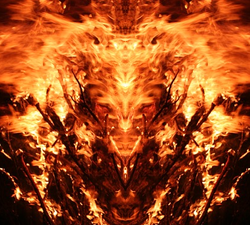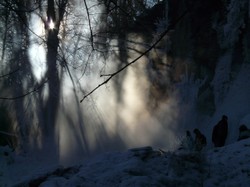Let us have a look at some environmental factors. Freeman had drunk two pints of ale-strength drink several hours earlier. He was not drunk and next morning suffered no hangover. He works, but was not overworked or under any stress, and his relationship with his wife, who still does not know of the experience, hence his anonymity in this article, is good. There are no marital problems. Freeman has never had psychotic experiences and does not suffer hallucinations. He is very well educated and not prone to jump to conclusions. The absence of any factors that suggest hallucinatory experiences mean that skeptics cannot easily resort to claims of drunkenness or temporary insanity, hallucinations and so on, the standard and rather tired explain-all explanations of the strange and extraordinary that in explaining everything explain nothing.
It is quite conceivable that a person awakening from a dream might find that the dream imagery persists into the early stages of consciousness, and I suggest that this explains quite a few sightings at night, but Freeman was awake and was definitely not dreaming of anything. We might, however, observe that he was jolted into full alertness, so there is a possibility that he was not fully awake, and the edge of sleep can be a strange time, so a visual phenomenon that was the product of his own mind cannot be ruled out, and Freeman agrees, which is why he has not drawn a definite conclusion on what he saw.
A skeptical escape route will often be that he was ill and therefore hallucinating. Certainly,fevers, which cause high temperatures, are known cause hallucinations, and Freeman had one while an infant, but in this recent case he was not sick in any way whatsoever and has been for a long time in good health. He is not taking any illegal drugs and has no medications that produce hallucinatory side effects.
While he admits that once or twice in the past he has sensed presences, these experiences have never included anything hallucinatory. This shows us that his mind is not given to express his experiences in terms of visual hallucinations
The light in the room was at quite a low level, but there was nothing unusual about the light conditions, no passing headlights that interplay with the shadows in the room, and at no time in the past in that room has there been any visual apparition or anything seeming to be one. This gives the lie to another skeptical escape route, that he was gullible. A gullible person would have taken the experience at face value, but Freeman has not done so. He is not gullible.







 Darkness over the Earth the skies darkened when Jesus was crucified16 days ago
Darkness over the Earth the skies darkened when Jesus was crucified16 days ago
 TheThousand Year Gardenon 11/26/2025
TheThousand Year Gardenon 11/26/2025
 Women of the Gospelson 10/11/2025
Women of the Gospelson 10/11/2025
 Religious Gardenson 08/25/2025
Religious Gardenson 08/25/2025




Comments
The audio element would have been counter productive. County Mayo was undergoing an argument about language, whether to use Irish or English. Our Lady's silence spoke volumes. She was not taking sides. The absence of an olfactory element at Knock indicated that scents have nonrevelatory function.
Thank you!
Might there be a word for a scented or an audio equivalent of a ghost or of a spirit?
For example, what if my favoritest miracle at Knock -- and I mean no blasphemy or disrespect or facetiousness here -- had had an audio or a scented manifestation?
There is no agreement. We all have a spirit, but a ghost is a visual manifestation that reveals a deceased person or occasionally animal. A spirit may be an angel or demon or a nature spirit.
The introductory paragraph employs the word ghost.
What is the difference between a ghost and a spirit, according to eastern-ponders?
The pigs were in the pagan territory of Decapolis, where
Jewish rules were not followed.hence the inhabitants ate pork.What Jesus knew about science is unclear.
Your comment of 12/03/2016 contains the observation that "In the tale of the Gerasene demoniac the evil spirits are clearly operative in the world, and hence not in Hell. They plead with Jesus not to send them into the pit, and he allows them to enter pigs."
Is not the pig deemed an unclean animal in the socio-economic times in which Jesus Christ lived?
Research reveals that animal viruses such as bird and Spanish flu spread to humans through intermediation of pigs.
Was there a cultural suggestion somewhere, were we given a reason somewhere as to why Jesus permits evil spirits to domicile in pigs (which non-Jews and non-Muslims eat)?
As the Son of God -- and I mean this not at all facetiously -- would Jesus not know that someone could get sick from being around those evil spirit-housing pigs or from eating them?
I put the story to a friend, who told me that her young daughter, aged four, had a similar experience. She brushed it off until a few weeks later when looking at a family photo album she showed the little girl a photograph of her own grandmother, whereupon the child said "That's the old lady. " My friend is adamant that she had never shown the child a picture of the grandmother before. Nothing can be concluded with any certainty from this parallel, but the fact that Freeman's experience is not a one-off instance does give food for thought.
BSG, your colleague's view that the figure that you saw was illusory may be right or wrong, but it comes from a process of reasoning whose assumptions he did not share with you. I suspect that he takes the Enlightenment world-view that believes that matter is all there is or that mind is merely an epiphenomenon dependent upon matter that exists but briefly, if at all and cannot survive the death of its body. In this view ghosts must be illusory. Right or wrong,people need to be clear to you about where their advice is coming from.
The Catholic Church does not deny the existence of ghosts,but makes no issue of them. Look at what Jesus says in Luke 24, that a ghost does not have flesh. At no point does he tell the apostles that there are no ghosts. Have we not realized that our view of the afterlife as a limited number of places [Heaven, Hell, Purgatory and Limbo] is unscriptural? In the tale of the Gerasene demoniac the evil spirits are clearly operative in the world, and hence not in Hell. They plead with Jesus not to send them into the pit, and he allows them to enter pigs. Whatever we think of this strange story, we are shown that the spirits are at loose in the world, we have a picture of Jesus who does not wish to send even the evil ones into the pit, which I take to be hell. This story does not fit with the simplistic eschatology which teaches that there are the four places that I have mentioned which provide the destiny for all spirits upon death.
In England we sometimes joke about pleading the fifth amendment, which we know about and have heard characters in American films claim. [I wish we did have a constitution like yours.] The person concerned is a British person and has led an innocent life.He was speaking in a jocular way.